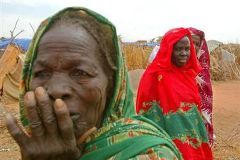Sudan says it isn’t afraid of UN resolution
By MOHAMED OSMAN, Associated Press Writer
KHARTOUM, Sudan, Sep 20, 2004 (AP) — Sudan isn’t afraid of a U.S.-backed United Nations resolution threatening sanctions over the violence in Darfur, President Omar el-Bashir was quoted as saying.
 “We are afraid neither of the U.N. nor of its resolution,” state-run television quoted el-Bashir as telling a meeting of local political leaders Sunday in Khartoum. The report did not elaborate.
“We are afraid neither of the U.N. nor of its resolution,” state-run television quoted el-Bashir as telling a meeting of local political leaders Sunday in Khartoum. The report did not elaborate.
El-Bashir’s remarks came as Louise Arbour, the U.N. high commissioner for human rights, arrived in Khartoum in preparation for a trip to the western Darfur region to look into the humanitarian situation.
Western governments and international aid agencies maintain government-backed militias burned and looted villages and raped or killed many inhabitants. The United States has said genocide was being carried out.
Arbour met with Justice Minister Ali Osman Mohamed Yassin, who said his government was ready to assist her but that “there is no genocide or cases of rape” in Darfur. The government has denied supporting the militiamen and rejected characterization of genocide.
Sudan’s parliament speaker, Ahmed Ibrahim Tahir, was quoted by the official Sudan Media Center as making similarly defiant remarks during a meeting of tribal leaders in Darfur. “If Iraq has opened one gate to hell for the West, we are going to open seven gates,” Tahir was quoted as saying.
Such a U.N. resolution, according to a Sudanese Foreign Ministry official, will only make it harder for the government to calm an insurrection in the region.
But despite his criticism, Mutrif Sideeq indicated his government would try to comply with the resolution meant to push it to rein in ethnic Arab militias accused of killing ethnic African villagers and creating an even deadlier humanitarian crisis. The government is accused of backing the Arab militia as a strategy against rebels based among Darfur’s African tribespeople.
“We in the government will go ahead in trying to bring the situation to normal in Darfur, regardless of what is being said about pressure being applied on the government,” Sideeq told state-run radio Omdurman.
But “we think the resolution was faulty and sends a wrong message to the rebels,” said Sideeq, a Foreign Ministry undersecretary.
Even before the resolution was passed, Sudanese officials had complained that they believed the U.S. position was encouraging rebels to take a hard line at peace talks. The talks broke down last week, but the Nigerian hosts and mediators held out the prospect that delegates could return to the table, possible in October.
The conflict began when the two Darfur rebel groups rose up in February 2003, accusing the Arab-dominated government in Khartoum of neglect and discrimination. Since then, according to U.N. estimates, more than 1.2 million people have fled their homes to escape the violence and more than 50,000 have died. Most of the deaths are linked to disease or malnutrition in crowded, filthy camps for the displaced.
In an 11-0 vote Saturday with four abstentions — China, Russia, Pakistan and Algeria — the Security Council said it would meet again to consider sanctions against Sudan’s petroleum sector or other punitive measures if the government doesn’t act quickly to stop the violence and bring the perpetrators to justice.
The resolution also authorizes U.N. Secretary-General Kofi Annan to appoint a commission to investigate reports of human rights violations in Darfur and determine “whether or not acts of genocide have occurred,” as the United States and others have charged.
Saturday, before the resolution was passed, President Omar el-Bashir said his government was committed to finding a “peaceful settlement to the question of Darfur.” He was speaking to reporters after meeting visiting Spanish Foreign Minister Miguel Angel Moratinos, whose country currently chairs the U.N. Security Council.
Also Saturday, at a late evening press conference, the government delegation to the peace talks said it was “committed to returning to the negotiating table with the Darfur rebels any time, anywhere ….”
Majzoub Khalifa, head of the delegation, said U.S. Secretary of State Colin Powell’s declaration last week that genocide was occurring in Darfur “resulted in negative atmosphere and pushed the rebels into adopting hard-line positions.”
The talks had made little progress since they opened Aug. 23. Rebels said the government was seeking concessions that would have led to their annihilation.
In the final days, the rebels rejected a partial accord that would have cleared the way for aid agencies’ access to refugees, saying provisions already in place allowed humanitarian work and refusing to sign anything before the government pledged to disarm the Janjaweed, as the Arab militia members are known.
The government, accused in the past of blocking humanitarian work, had said it was ready to sign the humanitarian accord.
